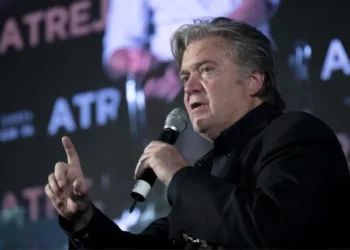Bob MacGuffie: We Have Now Begun The ‘Resolution’ Of This Fourth Turning
Steve Bannon and Bob MacGuffie discussed historical cycles and financial crises, drawing on themes from the book The Fourth Turning. Bannon expressed gratitude for MacGuffie’s insights and referenced the book’s concept of history unfolding in 80-100 year cycles. These cycles include periods of crisis, such as the American Revolution, Civil War, and World War II, which drive generational change and societal transformation.
MacGuffie reflected on the accuracy of the book’s predictions, noting how the authors anticipated a major crisis around the 2000s, which aligned with events like the 2008 financial collapse. They agreed this crisis had long-lasting impacts, including negative interest rates and a historic concentration of wealth, exacerbated by policies under President Obama, whom they described as paradoxically progressive yet complicit in entrenching wealth disparities.
Bannon highlighted how these crises reshape history, touching on Nancy Pelosi’s controversial financial decisions and their implications. MacGuffie tied these observations to broader patterns of societal upheaval and renewal, suggesting that Trump’s leadership represents an opportunity to guide America through its current crisis, likening it to completing a historic cycle. Both emphasized the importance of understanding these historical patterns to navigate the challenges ahead.
"This Is MASSIVE Federal Government Overreach”: Peter McIlvenna On The Corporate Transparency Act
Steve Bannon and Peter McIlvenna explored historical cycles, populist movements, and the growing centralization of government oversight. Bannon emphasized the role of seemingly marginal figures rising to prominence during crises, drawing parallels from history, such as Napoleon, the Civil War, and World War II. He highlighted the cultural and spiritual dimensions of populist-nationalist movements, contrasting them with socialism or communism while acknowledging the necessity of collective action during pivotal moments.
McIlvenna shared concerns about radical changes in demographics and ideology in the UK, referencing the rise of radical Islam and its societal impacts. He likened the challenge to America’s historical reckoning with slavery, quoting Jefferson’s warning about its eventual consequences. The discussion touched on the erosion of traditional institutions, with Bannon calling for their reform, transparency, or replacement to restore vitality and purpose.
They also addressed the Corporate Transparency Act, which mandates small businesses to register with the Financial Crimes Enforcement Network (FinCEN), labeling it a massive domestic surveillance initiative. Both critiqued this move as government overreach, arguing it unfairly targets small businesses under the guise of combating financial crimes, reflecting broader concerns about state intrusion and centralized power.
Col. Newsham Rails On The United States’ Continuous Bailouts Of The Chinese Communist Party
Cleo Paskal, Steve Bannon, and Col. Newsome engaged in a wide-ranging discussion highlighting the multifaceted threat posed by the Chinese Communist Party (CCP). Newsome argued that China’s attack on the U.S. is not merely a future kinetic possibility but an ongoing reality through economic, chemical, and psychological warfare. He noted that U.S. elites have been manipulated into downplaying the CCP’s danger, likening it to a benign presence.
The conversation critiqued American complicity, pointing to deliberate economic decisions targeting industries like steel, resulting in decimated communities such as Sparrow’s Point. The speakers emphasized the CCP’s organized crime-like structure, driven by power and control rather than governance. Historical examples like Evans Carlson’s admiration of Communist guerrilla tactics during WWII were cited to show the enduring naivety of U.S. elites.
Bannon highlighted Wall Street’s complicity, with firms like Goldman Sachs prioritizing profits over ethics, while Musk and others continue business with the CCP despite its criminal nature. The discussion traced this flawed engagement to Nixon’s era, arguing that illusions of wealth and anti-American sentiment have blinded U.S. policymakers to the CCP’s strategic aims, creating a corrupt, detrimental relationship.
Part One:
"This Is Going To Give You Another Reason To Take Over Canada”: Cleo Paskal On The Deep Roots Of Canada And The CCP
Part Two:


![Bannon’s WarRoom, Show Clip Roundup 11/7/2024 [AM]](https://warroom.org/wp-content/uploads/2024/11/WarRoom-Logo-350x234.jpg)
![Bannon’s WarRoom, Show Clip Roundup 10/22/2024 [PM]](https://warroom.org/wp-content/uploads/2024/10/fb2ffed0-b36b-11e9-bffe-749dcc4e236f-350x250.jpg)